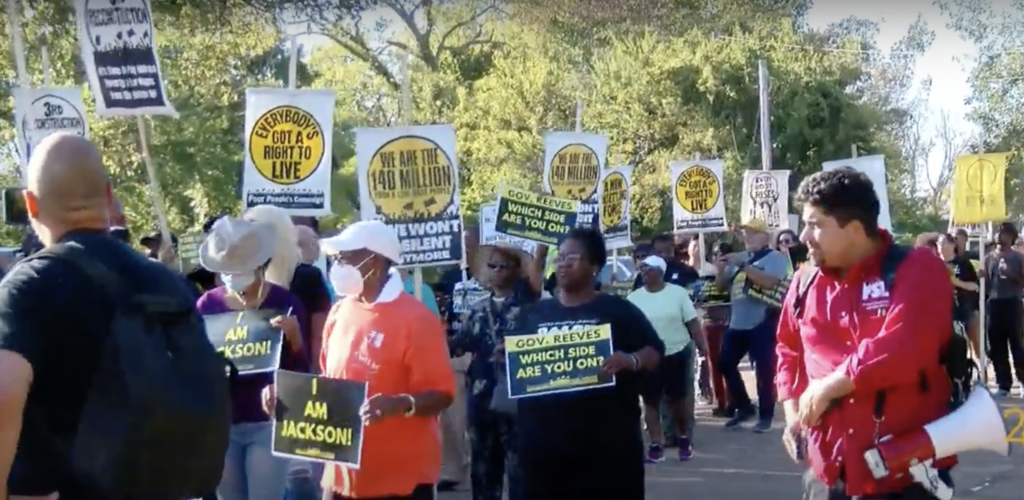
The lead ‘organizer for the Jackson People’s Assemblies, said she recently spoke with Jackson residents who told her they still have “brown, discolored water or unknown particles floating in the water” coming out of their taps.‘
Editor’s note: See Mississippi Free Press’s original publishing of this article at https://bit.ly/48S9PaO
Jackson needs more community oversight and transparency as efforts to repair the city’s beleaguered water infrastructure continue, organizers with the Mississippi Poor People’s Campaign and the People’s Advocacy Institute told a federal court in a Sept. 25 filing.
They argued in a Sept. 26 press release that Interim Third Party Manager Ted Henifin and the EPA have not done enough to ensure open communication with residents and community leaders about the quality of the water or long-term plans to redesign the crumbling system.
They are calling for increased information-sharing related to water quality and the management of federal funds to fix the public water system, regular updates about repair work, and public oversight of long-term contracts for completing the repairs.
“We are also requesting the EPA provide residents with water filters and water tests,” Executive Director of the People’s Advocacy Institute Rukia Lumumba said at a press conference on Sept. 27.
“Residents of the City of Jackson are tired. We cannot afford another hiccup with this water,” Danyelle Holmes of the Mississippi Poor People’s Campaign said.
See Motion to Intervene at https://www.mississippifreepress.org/wp-content/uploads/2023/10/55-Motion-to-Intervene.pdf
In June, Henefin told U.S. District Court for the Southern District of Mississippi Judge Henry T. Wingate that Jackson’s water was safe to drink because “it meets the standards of the Safe Drinking Water Act.”
Jackson residents question the validity of these statements. “We have sat down with experts and we know what common sense tells us,” Holmes said.
Brooke Floyd, lead organizer for the Jackson People’s Assemblies, said she recently spoke with Jackson residents who told her they still have “brown, discolored water or unknown particles floating in the water” coming out of their taps.
Both the City of Jackson and the EPA have agreed not to oppose the organizations’ motion to intervene in the case.
“The ball is now in the judge’s court,” said Mikaila Hernández, Bertha Justice Fellow and attorney at the Center for Constitutional Rights.
Judge Wingate previously denied a July request from City of Jackson officials who asked for more transparency about Henifin’s plans for the water treatment system. Wingate pushed back on the request, questioning city officials about their own transparency with residents over the years.
“Are you saying that you expect the third-party manager and the court to continue the same kind of transparency and communication that the City has exhibited over the years? “You’re saying the City has been transparent, are you not?” the judge asked city officials.
Wingate responded to community leaders and activists by asserting that Henifin was “clearly the man for the job.”
‘This Isn’t an Attack on Mr. Henefin’
Jackson’s long-standing water issues were thrust into the national spotlight in August 2022 after record-setting rainfall caused the city’s largest water treatment system to fail, leaving residents without safe drinking water for nearly two months.
This petition to the EPA is the latest episode in a yearslong series of boil water notices, water shutoffs and other infrastructure issues in Jackson. A dwindling tax base and a tug of war between local and state government officials over the responsibility to fix these issues has resulted in Jackson residents having to deal with day-to-day fears and confusion over the safety of their water.
“A widespread lack of trust in the system led most residents to stop drinking the water years ago,” the statement read.

Activists are citing “a provision under the Safe Drinking Water Act that gives residents and community groups like them the right to intervene and partner with the government in enforcing the Act’s requirements,” Hernández said.
“The Safe Drinking Water Act (SDWA) recognizes that since everyone drinks water, everyone has the right to know what’s in it and where it comes from. All water suppliers must notify consumers quickly when there is a serious problem with water quality. The public must have a chance to be involved in developing source water assessment programs, state plans to use drinking water, state revolving loan funds, state capacity development plans, and state operator certification programs,” an EPA.gov document states.
Last month, Henifin listened to concerns from residents and city leaders about a lack of transparency from JXN Water. In a statement to Judge Wingate, he encouraged residents to follow JXNWater.com and JXN Water social media posts for updates.

“I don’t disagree with the comments that our communication hasn’t been the best but we’re here to fix the water system first, it’s triage. We do need to transition to communication and some other things. That’s all part of the plan,” Henifin told WLBT.
That plan, organizers say, hasn’t been clear enough to ease concern from residents of Jackson, a predominantly Black city. But organizers clarified that their requests to the EPA have nothing to do with Henifin’s race, contrary to comments Judge Wingate made last month about the root of the complaints. The judge wrote that he saw “no logical rationale (as to) why an African American would be better suited to fix a lingering problem which has gone unresolved for decades by past African American leadership.”
“This is not an attack on Mr. Henifin. When the judge makes a statement that we just want somebody Black to fix our water, that’s an insult,” said Holmes. She said the Mississippi Poor People’s Campaign has received concerns from white residents as well about the safety of their water.
It’s Time For Everyone to Get Current”
This month, JXN Water announced that crews would begin replacing pipes at Fortification and Prentiss Streets which they estimated will require two months of road closures and detours in the area. On Sept. 27, the company also sent out an update warning of impending changes to JXN Water’s billing process.
Customers of JXN Water started receiving letters informing them that JXN Water will begin shutting off water service for non-payment.
“To keep things flowing, we need money to run the system, make needed repairs, and replace things before they break. That should come from water bill payments. It is not happening,” Henefin said in the letter.
Henifin said that no customers have had their water shut off yet but “it’s important we give the community time to prepare for turnoffs resuming later this year.”
JXN Water is encouraging customers to call the 24-hour customer service line at 601-500-5200 if they need to set up a payment plan before water turn-offs begin. They said customers can also log in at JXNwater.com/myaccount at any time to pay their bills.
JXN Water has partnered with The Community Foundation for Mississippi to collect donations to assist new customers with paying their current bills. However, JXN Water said these funds will not be used towards paying off long-standing water bill balances. Donations can be made to the JXN Water Customer Assistance Fund at the Community Foundation for Mississippi at https://formississippi.org/.
As Henifin tackles Jackson’s water issues, he’s also now tasked with figuring out how to fix the sewer system which has been under a consent decree with the EPA for the last ten years. Last week, Judge Wingate officially gave Henifin control of Jackson’s sewer system.
“We want to work with the third-party manager. We want the city to have resources to fix Jackson’s water to where we won’t need a third-party manager or if we do, residents can have a say in who the third-party manager is. Let’s do it together,” Rukia Lumumba said.
Capital City reporter Shaunicy Muhammad has an enduring interest in social-justice issues, class inequality, Africana studies and cultural storytelling. Her educational background includes a journalism degree from Spring Hill College in Mobile, Ala. Her time as an undergraduate student culminated with the production of the senior research project “Black Unrest, Riots and How Newspapers Frame the Narrative of African American Social Protest,” which analyzed patterns in the narratives reporters used when explaining the social unrest and uprisings after the deaths of Freddie Gray, Trayvon Martin and Michael Brown. Shaunicy formally served for two years, in Atlanta, Ga., and Buffalo, N.Y.,, respectively, as an Americorps member focused on facilitating safe learning environments for youth experiencing behavioral and/or emotional challenges in traditional and alternative classroom settings. Additionally, her work history includes experience in marketing and corporate communications in the nonprofit sector. She is reporting on the capital city with a year-long focus on causes, effects and solutions for systemic inequities in South Jackson, supported by a grant from the Center for Disaster Philanthropy. Email her at shaunicy@mississippifreepress.org.
